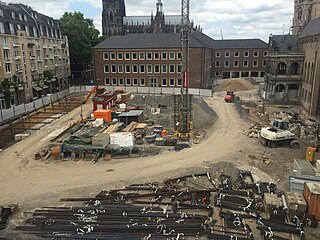Related Research Articles

Civil engineering is a professional engineering discipline that deals with the design, construction, and maintenance of the physical and naturally built environment, including public works such as roads, bridges, canals, dams, airports, sewage systems, pipelines, structural components of buildings, and railways.
In the law of torts, malpractice, also known as professional negligence, is an "instance of negligence or incompetence on the part of a professional".
A statute of limitations, known in civil law systems as a prescriptive period, is a law passed by a legislative body to set the maximum time after an event within which legal proceedings may be initiated. In the United States, a government agency is permitted by the Congress to create under federal regulations its own statute of limitations.

Charles's law is an experimental gas law that describes how gases tend to expand when heated. A modern statement of Charles's law is:
When the pressure on a sample of a dry gas is held constant, the Kelvin temperature and the volume will be in direct proportion.
Adjudication is the legal process by which an arbiter or judge reviews evidence and argumentation, including legal reasoning set forth by opposing parties or litigants, to come to a decision which determines rights and obligations between the parties involved.

Construction is a general term meaning the art and science to form objects, systems, or organizations, and comes from Latin constructio and Old French construction. To construct is the verb: the act of building, and the noun is construction: how something is built, the nature of its structure.

The Senate of the Philippines is the upper house of Congress, the bicameral legislature of the Philippines; the House of Representatives is the lower house. The Senate is composed of 24 senators who are elected at-large under plurality-at-large voting.

In the context of United States law, originalism is a concept regarding the interpretation of the Constitution that asserts that all statements in the constitution must be interpreted based on the original understanding "at the time it was adopted". This concept views the Constitution as stable from the time of enactment and that the meaning of its contents can be changed only by the steps set out in Article Five. This notion stands in contrast to the concept of the Living Constitution, which asserts that the Constitution should be interpreted based on the context of current times and political identities, even if such interpretation is different from the original interpretations of the document. Originalism should not be confused with strict constructionism.
In the United States, strict constructionism is a particular legal philosophy of judicial interpretation that limits or restricts such interpretation only to the exact wording of the law.

The Preamble to the United States Constitution, beginning with the words We the People, is a brief introductory statement of the Constitution's fundamental purposes and guiding principles. Courts have referred to it as reliable evidence of the Founding Fathers' intentions regarding the Constitution's meaning and what they hoped the Constitution would achieve.
A subcontractor is an individual or a business that signs a contract to perform part or all of the obligations of another's contract.

A butterfly knife, also known as a Balisong, fan knife or Batangas knife, is a type of folding pocketknife that originated in the Philippines. Its distinct features are two handles counter-rotating around the tang such that, when closed, the blade is concealed within grooves in the handles. A latch holds the handles together, typically mounted on the one facing the cutting edge.
Statutory interpretation is the process by which courts interpret and apply legislation. Some amount of interpretation is often necessary when a case involves a statute. Sometimes the words of a statute have a plain and a straightforward meaning. But in many cases, there is some ambiguity in the words of the statute that must be resolved by the judge. To find the meanings of statutes, judges use various tools and methods of statutory interpretation, including traditional canons of statutory interpretation, legislative history, and purpose. In common law jurisdictions, the judiciary may apply rules of statutory interpretation both to legislation enacted by the legislature and to delegated legislation such as administrative agency regulations.
The attractive nuisance doctrine applies to the law of torts in some jurisdictions. It states that a landowner may be held liable for injuries to children trespassing on the land if the injury is caused by an object on the land that is likely to attract children. The doctrine is designed to protect children who are unable to appreciate the risk posed by the object, by imposing a liability on the landowner. The doctrine has been applied to hold landowners liable for injuries caused by abandoned cars, piles of lumber or sand, trampolines, and swimming pools. However, it can be applied to virtually anything on the property.

Ahilya Bai Holkar was the hereditary noble queen of the Maratha Empire, in early-modern India. She established Maheshwar as the seat of Holkar Dynasty.

The Department of Public Works and Highways, abbreviated as DPWH, is the executive department of the Philippine government solely vested with the Mandate to “be the State's engineering and construction arm” and, as such, it is “tasked to carry out the policy” of the State to “maintain an engineering and construction arm and continuously develop its technology, for the purposes of ensuring the safety of all infrastructure facilities and securing for all public works and highways the highest efficiency and the most appropriate quality in construction” and shall be responsible for “(t)he planning, design, construction and maintenance of infrastructure facilities, especially national highways, flood control and water resources development systems, and other public works in accordance with national development objectives,” provided that, the exercise of which “shall be decentralized to the fullest extent feasible.”
Construction law is a branch of law that deals with matters relating to building construction, engineering, and related fields. It is in essence an amalgam of contract law, commercial law, planning law, employment law and tort. Construction law covers a wide range of legal issues including contract, negligence, bonds and bonding, guarantees and sureties, liens and other security interests, tendering, construction claims, and related consultancy contracts. Construction law affects many participants in the construction industry, including financial institutions, surveyors, quantity surveyors, architects, builders, engineers, construction workers, and planners.
In the North American legal system and in US Occupational Safety and Health Administration regulations, willful violation or willful non-compliance is a violation of workplace rules and policies that occurs either deliberately or as a result of neglect.
The purposive approach is an approach to statutory and constitutional interpretation under which common law courts interpret an enactment within the context of the law's purpose.

Planning permission or developmental approval refers to the approval needed for construction or expansion, and sometimes for demolition, in some jurisdictions. It is usually given in the form of a building permit.
References
- ↑ Lundmark, Thomas (2012-09-27). Charting the Divide Between Common and Civil Law. OUP USA. p. 338. ISBN 978-0-19-973882-3.